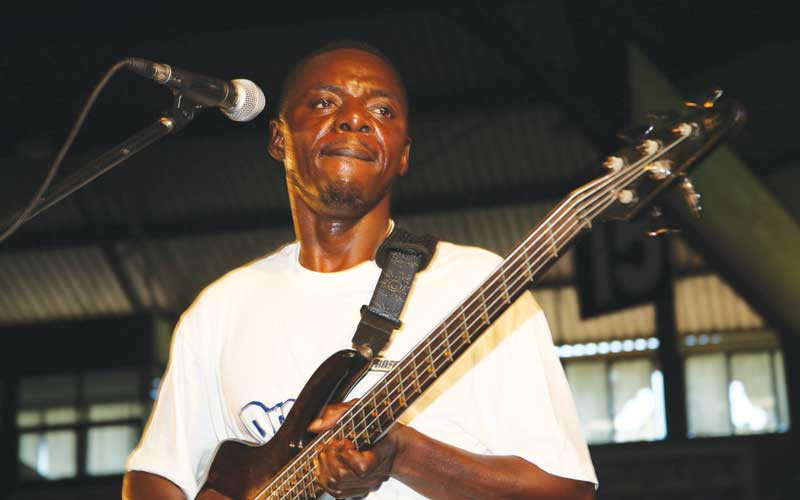

Soundtrack: Phillip Chidavaenzi
THREE things come to mind when one thinks of Mathias Mhere as a musician — determination, drive and passion.
There are just enough things in the music trenches, to discourage an artiste from offering new work to a hungry market that is quick to pawn the product just for a song through piracy.
But Mhere keeps pushing, releasing new work often and expanding his discography — now at eight with last week’s release of Greater than Solomon after the seventh album, Panogara Nyasha, hit the market last year. He is a musician you cannot afford to ignore.
Mhere is unfazed by the quick succession of albums as he is driven by the desire to satisfy his fans.
Despite a few innovations here there, the album is still purely Mathias Mhere. In a world where a music album’s final outcome is determined by the producer, Mhere opted to pool together the skills of some of the country’s finest in the mould of Prince “Oskid” Tapfuma, Lyton Ngolomi, Tamuka “DJ Tamuka” Makuluni, Mcdonald “MacDee” Chidavaenzi, Tapiwa “Maselo” Jera and Nigel Chingombe. It is a galaxy of stars that ensured a top-drawer album, proving that too many cooks do not always spoil the broth.
An interesting observation is the catchy titles of some of the tracks that make up this offering, in particular Mai John, Jakuchichi and Hembe Yemubhero. At face value, there is probably nothing “gospel” about these tracks, but Mhere has a few aces up his sleeve.
- Chamisa under fire over US$120K donation
- Mavhunga puts DeMbare into Chibuku quarterfinals
- Pension funds bet on Cabora Bassa oilfields
- Councils defy govt fire tender directive
Keep Reading
Mai John, the second track on the album, comes with a top-notch video featuring the hilarious Prosper “Comic Pastor” Ngomashi. The title is so immediate and familiar that it could be about that talkative woman next door or the rumour-monger down the street in your neighbourhood. The song is themed around lazy people that rely on occult charms they receive from the Mai Johns of this world, which end up tearing their families apart.
The sixth song, Hembe Yemubhero, carries in its title the negative connotations associated with cheaper, second-hand clothes, where society’s poor who cannot afford new clothing brands find their succour. Well, while there may be nothing wrong with second-hand clothes in a poverty-stricken society like ours, where every dollar counts, there is everything wrong when a young woman turns herself into some kind of second-hand piece of clothing that any prospective buyer can just pick up, gaze at, try on, and then throw back onto the ground for the next potential buyer to sample. Hembe Yemubhero is a strong metaphor for a young woman who allows just any man to “sample” her, ultra vires the biblical caution that your body is a temple of the Holy Spirit and must, therefore, be revered as such.
In Jakuchichi, the eighth song, there is a call for believers to make their requests known unto God, itself a biblical invitation. Jakuchichi is the Shona term for “deluge” — like a massive outpouring of blessings that God is prepared to release on those that believe and call upon him.
On May 16 this year, Mhere lost his older brother Tungamirai from wounds sustained in a horrific car accident in Johannesburg. Gutted by his loss, he decided to entomb his brother’s memory in the song, Chipangamazano, which recalls the times they had together and the counsel he always received from the deceased.
This song is likely to find many takers among those that have lost their loved ones in various circumstances.
“He was my passionate fan and sometimes could predict which of my songs would dominate the airwaves. He also features in the video of the song, Favour,” Mhere said of his brother, soon after his death.
“He was very supportive of my music, and I’m definitely going to pen a song for him on the forthcoming album… The song is just to remember him. He loved music too, although he didn’t sing professionally.”
Nowadays, collaborations are the in-thing in music, where differently gifted artistes come together to blend their magic and produce a portent brew to delight their fans. In Greater than Solomon, Mhere courted Jah Prayzah in the sixth track Tirikufamba and Malawi’s Skeffa Chimoto in Nyika Dzibatane, the eleventh piece here.
Nyika Dzibatane is particularly interesting in that it is rare in gospel music to find artistes singing of unity among nations. Mhere and Chimoto bring that element as they appeal to nations to be united in the Lord, just as a Zimbabwean and Malawian came together to produce that one song. Curiously, Zimbabwe and Malawi — and Zambia — had always been historically tied together like “Siamese triplets” of sorts, having been part of the Federation of Rhodesia and Nyasaland.
Lilongwe-based Chimoto is not a new voice on the local music scene, having previously recorded with celebrated gospel outfit Church of Central Africa Presbyterian (CCAP) Voice of Mbare on their album titled Flash-Back.
Tsika Dzechipostora, the fourth song on the album, speaks to the contemporary state of the church as a universal body where idolised “men of God” run the show, drawing the glory to themselves by “single-handedly” working out miracles. This is juxtaposed by the “old church” when everything was centred on Christ, during which people got healed and miracles popped up during worship without anyone laying hands on another person. The song is a clarion call back to those traditions of old.
The other tracks on the album — a fusion of old and new sounds — are Ndizarurire, Munhu Haasekwe, Waikunda Nyika and Mafuta. Two songs that were initially meant to be part of the album, Kamushini and Mukombe Uyu, will now be released as singles later.











